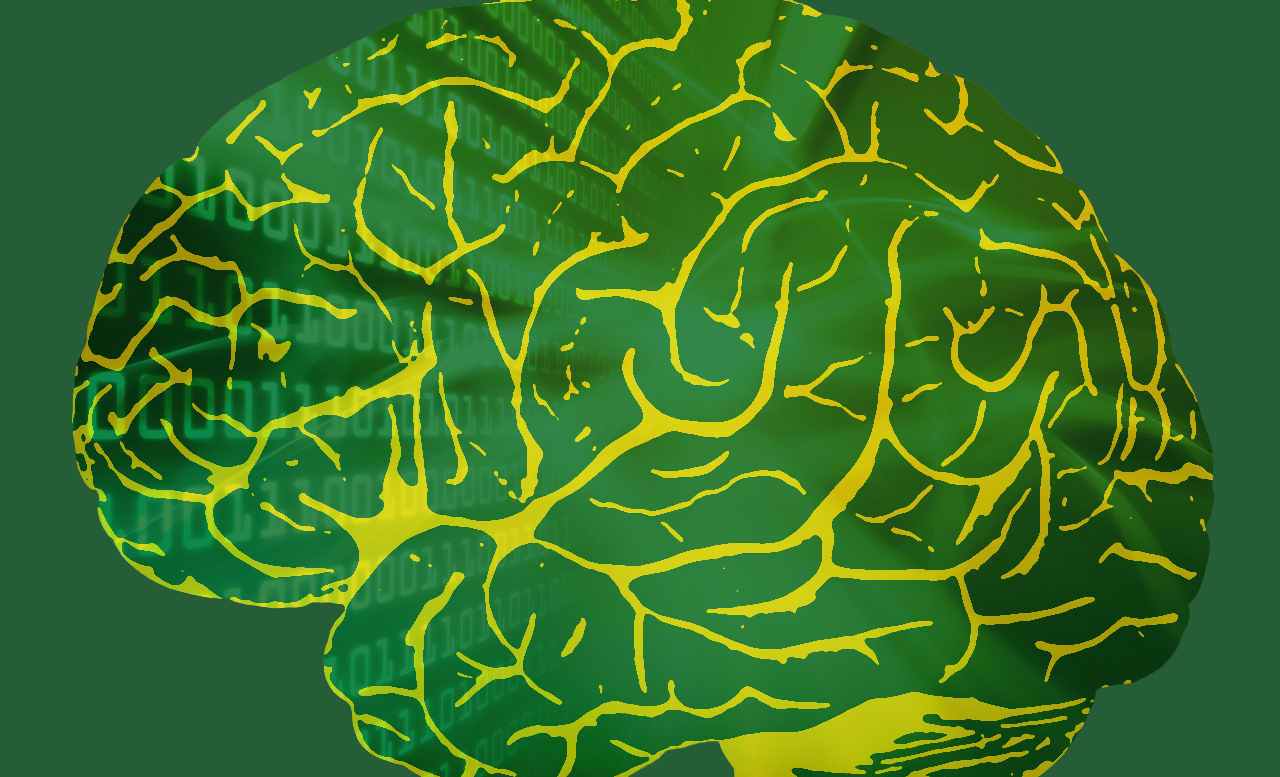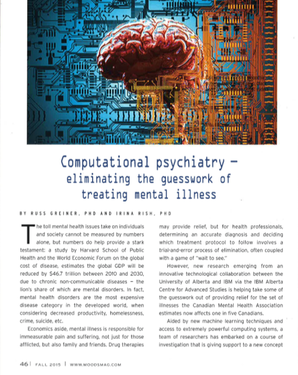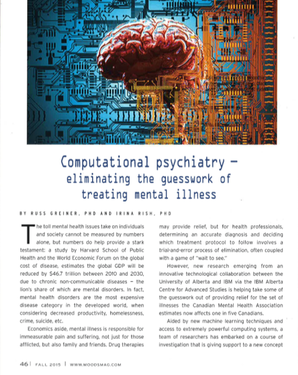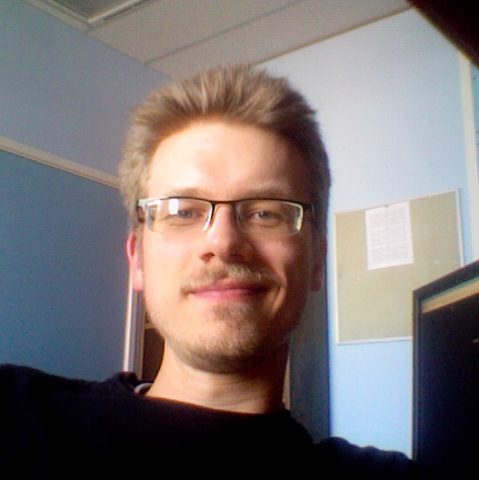
Computational Psychiatry
Psychiatric disorders impose a heavy burden on patients and their families. These disorders also cost the Canadian economy $51 billion each year (Lim 2008, Chronic Dis Can 28(3): 92-98). Economic costs of psychiatric illnesses are similarly gigantic in other countries.
Treating psychiatric illnesses is challenging in several ways. Psychiatric diagnosis is often not straight-forward, and this can make treatment less effective. For example, the early stages of major depressive disorder and bipolar disorder are often indistinguishable. Differentiating these two diseases early is highly desirable as the treatments are very different.
Psychiatric prognosis is also difficult. While effective psychiatric drug treatments are available, individual patients react differently to a given drug, making it difficult to predict the best treatment for an individual. Psychiatrists may try various drugs before finding an effective combination. This trial-and-error process is especially problematic as many drugs have unpleasant side-effects and most drugs take several weeks to become therapeutic. Psychiatric patients often become disillusioned and discontinue drug treatment that would have helped them.
We are working on technologies for improving diagnosis for psychiatric patients and for providing more accurate prognostic predictions of how patients will respond to treatment. The goal is to provide tools to assist medical doctors in making more accurate diagnoses and more effective treatment decisions. This should improve patients’ response to treatment, improve adherence to pharmacotherapy, and improve patient outcomes.

We apply advanced computational methods from machine learning, data science, and data mining to the problems of psychiatric diagnosis and prognosis. These approaches can utilize a variety of input data sources, ranging from written questionnaires and structured interviews to advanced neuroimaging and metabolomics. This computational approach is particularly well-suited to discovering subtle but clinically useful patterns in large, diverse datasets – the sort of pattern that a human researcher looking at the data with traditional analytical tools would not find. The goal of the computational approach is to discover patterns in the data – essentially complex biomarkers – that distinguish among patient types (diagnosis) or predict an individual patient’s response to treatment (prognosis). Such discoveries would allow for improved personalized psychiatric treatment that is customized to the individual.
We are a multidisciplinary group based in Alberta, Canada, including clinicians and scientists who work in the fields of mental health, neuroscience, population health, and machine learning. We have an active collaboration with the IBM Centers for Advanced Studies (CAS), CAS Alberta.
Publications
News
- Predicting early symptoms of schizophrenia in relatives of patients
- Diagnosing Schizophrenia accurately in early untreated stage
- Predicting treatment outcomes in Schizophrenia
- Diagnosing Schizophrenia
- How artificial intelligence could transform the medical world
- Statisticians step up to aid neurological health research
- Computational Psychiatry on Global Edmonton Health Matters
- Collaboration with IBM (CAS) — fMRI
- Hosting Globalink Internship Students
Our team showed that …
- Extending schizophrenia diagnostic model to predict schizotypy in first-degree relatives
- in Nature npj Schizophrenia [https://www.nature.com/articles/s41537-020-00119-y ]
- Radio: https://omny.fm/shows/danielle-smith/machine-learning-tool-used-to-predict-early-sympto”
- Other: https://www.nature.com/articles/s41537-020-00119-y/metrics
- https://www.eurekalert.org/pub_releases/2021-01/uoaf-aut012621.php
- https://www.miragenews.com/machine-learning-tool-used-to-predict-early-symptoms-of-schizophrenia-in-relatives-of-patients/
- https://edmonton.ctvnews.ca/this-machine-could-help-diagnose-schizophrenia-earlier-u-of-a-study-1.5282946
- https://www.technologynetworks.com/tn/news/ai-predicts-schizophrenia-symptoms-in-at-risk-population-344937
- https://www.dotmed.com/news/story/53808
- https://www.ualberta.ca/folio/2021/01/machine-learning-tool-used-to-predict-early-symptoms-of-schizophrenia-in-relatives-of-patients.html
Our team (led by Sunil Kalmady) published an article describing a way to diagnose never-treated Schizophrenia. Towards artificial intelligence in mental health by improving schizophrenia prediction with multiple brain parcellation ensemble-learning in Nature Schizophrenia.
- Using Artificial Intelligence to predict Schizophrenia – Research Matters (22 Jan 2019)
- Nimhans partners Canadian varsity to build AI capability for schizophrenia diagnosis – Tech Circle (23 Jan 2019)
- Schizophrenia identified in brain scans: U of A researchers – Edmonton Journal, Canoe (28 Jan 2019)
- Artificial intelligence for mental health – Ualberta News (28 Jan 2019)
- Artificial intelligence can help diagnose schizophrenia, U of A researchers say – The Star (28 Jan 2019), Our Windsor (29 Jan 2019)
- Radio Interview: 630 CHED Morning News with Bruce Bowie (29 Jan 2019)
- Improved AI-based tool increases accuracy of schizophrenia diagnosis – Folio (30 Jan), Medical Express, Nikola News (31 Jan 2019), ECN (1 Feb 2019)
- UAlberta researchers marry AI-learning and psychiatry for schizophrenia diagnosis – Taproot Edmonton (30 Jan 2019)
- This AI tool can diagnose schizophrenia with 87% accuracy – The Economic Times (1 Feb 2019), Vadodara Live (in Hindi) (2 Feb 2019)
- (Turkish) Artificial intelligence will work for mental health – Hurriyet (1 Feb 2019)
- (Russian) An improved AI-based tool will help scientists improve the accuracy of schizophrenia diagnosis – DNI24 (1 Feb 2019), Fishki (2 Feb 2019)
- (Arabic) Using Artificial Intelligence To Predict Schizophrenia – JISR labs (2 Feb 2019)
- (Japanese) AI can diagnose schizophrenia with high accuracy – The Medical AI Times (3 Feb 2019)
- New AI tool increases accuracy of schizophrenia diagnosis – The Pioneer, Business Standard, Times of India (1 Feb 2019), Hindustan Times, CT News, Marathtimes (in Marati) (3 Feb 2019), AITopics – AAAI (4 Feb 2019)
- Scientists develop AI-powered tool to accurately diagnose schizophrenia- Asean breaking News, International Business Times (2 Feb 2019)
- AI diagnoses schizophrenia from brain scans – IEEE GlobalSpec (5 Feb 2019)
- Increasing accuracy of Schizophrenia diagnosis with AI – Medical View (6 Feb 2019)
- How AI is more accurately diagnosing schizophrenia – making it easier for doctors to treat patients – Compelo (26 Feb 2019)
- AI identifies schizophrenia with 87% accuracy – AI in Healthcare (26 Feb 2019)
- AI detects schizophrenia from fMRIs with 87% accuracy – Health Imaging (28 Feb 2019)
- How AI may help diagnose mental illnesses – Research Stash, Indian Science Journal, The Hindu Businessline, Down To Earth, VigyanPrasar (6 Mar 2019)
- AI to Help Diagnose Mental Diseases such as Schizophrenia – Review Health World (7 Mar 2019)
- AI can help diagnose mental illnesses – Telangana Today (11 Mar 2019)
- AI to diagnose schizophrenia – Health Issues India (19 Mar 2019)
- (Turkish) Artificial Intelligence can now Detect Schizophrenia! – Tamindir (10 Apr 2019)
- Breakthrough Study by U of A Schizophrenia Researcher Featured on German Television Show (01 Dec 2019)
Also, this research was featured in –
- (Spanish) Our favorites of January: 5 posts of the sector that you should not miss – LUCA AI Powered Decisions (6 Feb 2019)
- 6 Practical Applications of Artificial Intelligence that are impacting Major Industries Worldwide – iTrain (26 Feb 2019)
- Randy Cassingham’s ‘This is True’ Podcast – Extending Thinking Beyond Humans (Time: 11:15) – 11 Mar 2019
- Singularity Pulse Volume 65 -Decimal Point Analytics (11 Mar 2019)
- (Personal Interview in Turkish) Artificial intelligence-backed robot army diagnosed schizophrenia with high accuracy – Hurriyet (10 Apr 2019)
- #empaschiz hashtag on Twitter
A story on this research was aired on german national TV show nano (channel 3Sat) – AI against schizophrenia (Time: 21:50) – 2 Oct 2019
[Research was conducted in collaboration with National Institute of Mental Health and Neurosciences, India and funded by IBM CAS Alberta, MITACS, Wellcome Trust/DBT India Alliance, DST, ICMR, Alberta Machine Intelligence Institute, NSERC]
The research was led by our team member Bo Cao [UofA’s Department of Psychiatry], with the collaboration of Xiang Yang Zhang [University of Texas Health Science Center at Houston] “Treatment response prediction and individualized identification of first-episode drug-naïve schizophrenia using brain functional connectivity” was published in Molecular Psychiatry.
- Machine learning helps to predict the treatment outcomes of schizophrenia – UAlberta Medicine News (12 July 2018)
- Machine learning takes major step in helping predict and treat schizophrenia – Folio (12 July 2018)
- Machine Learning Helps Predict Schizophrenia Treatment Outcomes – Technologynetworks.com (16 July 2018)
Our team (led by Mina Gheiratmand [UofA] and Irina Rish [IBM]) published an article Learning stable and predictive network-based patterns of schizophrenia and its clinical symptoms (in Nature Schizophrenia) describing a way to diagnose schizophrenia.
- IBM and University of Alberta publish new data on machine learning algorithms to help predict schizophrenia — Amii website (Media Release) (2017.07.21)
- Artificial intelligence can help better diagnose schizophrenia, says U of A and IBM researchers – Edmonton Journal (2017.07.20)
- Machine learning enables new insight into schizophrenia – UofAlberta Science News (2017.07.21)
- U of A research shows faster, more accurate schizophrenia diagnosis possible with artificial intelligence – CBC News (2017.07.21)
- IBM’s AI Is Improving Healthcare By Advancing Cancer, Schizophrenia Research – International Business Times (2017.07.21)
- An ‘AI’ that can diagnose schizophrenia from a brain scan – here’s how it works (or doesn’t) – The Guardian (26 July 2017)
- Better Diagnosis of Schizophrenia with Artificial Intelligence – LifePulseHealth (2017.07.23)
- Utilizing A.I., Machine Learning to Better Understand Schizophrenia — R&D Magazine (2017.07.24)
- AI ‘learns’ to predict schizophrenia from brain MRI — Radiology Business (2017.07.28)
- Machine Learning May Improve Schizophrenia Diagnosis – Medscape (2017.08.05)
- Working to better understand schizophrenia – CTV News [Video] (2017.08.24)
- University Of Alberta & IBM Testing Artificial Intelligence To Diagnose Schizophrenia– News Report (2017.09.05)
See also Metrics
[Research sponsored by IBM CAS Alberta, Alberta Innovates-Health Solutions (AIHS), AMII, CIHR, NSERC]
Prof. Greiner was interviewed for article in Toronto Star: here (9 May 2016)
Interviewed for article at UofA FoS page: here (1 Apr 2016)
Global’s Su-Ling Goh talks to Professors Russ Greiner and Matt Brown about their research into using computers to analyze MRI brain scans to diagnose and treat mental illness (in collaboration with IBM).
Global News Clip (Video [ 1:30 ] – 2015.10.14)
Dr. Russ Greiner and members of his lab at the University of Alberta are applying machine-learning approaches to find patterns in brain imaging that will help predict or diagnose brain dysfunctions such as ADHD, Alzheimers and schizophrenia. “We’re helping to advance the emerging field of ‘computational psychiatry.’ Both diagnostic and prognostic tools have high potential for commercialization, to be further developed in companies in Alberta, and elsewhere,” says Dr. Greiner. Currently diagnoses are typically subjective as they are based on a professional’s assessment of whether a patient exhibits a benchmark combination of behaviours on list of criteria. Using IBM technology, researchers at University of Alberta and the University of Calgary will instead build a bio-based system to help identify and develop better, faster, more reliable treatments for mental health, one of the most expensive disease categories in the developed world.
See IBM News Release (2015.06.24) Also Moods magazine (2015.09.01)

International undergrads can join U of Alberta research groups for the summer, with funding provided by the Mitacs Globalink program. My lab had the honor of hosting two Mitacs Globalink Summer Students (July 2014).
This was covered by
- Breakfast TV (CityTV, channel 7): 7:45am, 30/July/2014: Diverse City Video Clip (youtube)
- Edmonton Journal: International students contribute to U of A research
- Alberta Technology Futures
- Carousel
- Faculty of Science
Using MRIs to map gender differences in the brain (neuroscience meets computing science)…
Apps for health monitoring (computing science meets public health)…
Our team (led by Mina Gheiratmand [UofA] and Irina Rish [IBM]) published an article Learning stable and predictive network-based patterns of schizophrenia and its clinical symptoms (in Nature Schizophrenia) describing a way to diagnose schizophrenia.
- IBM and University of Alberta publish new data on machine learning algorithms to help predict schizophrenia — Amii website (Media Release) (2017.07.21)
- Artificial intelligence can help better diagnose schizophrenia, says U of A and IBM researchers – Edmonton Journal (2017.07.20)
- Machine learning enables new insight into schizophrenia – UofAlberta Science News (2017.07.21)
- U of A research shows faster, more accurate schizophrenia diagnosis possible with artificial intelligence – CBC News (2017.07.21)
- IBM’s AI Is Improving Healthcare By Advancing Cancer, Schizophrenia Research – International Business Times (2017.07.21)
- An ‘AI’ that can diagnose schizophrenia from a brain scan – here’s how it works (or doesn’t) – The Guardian (26 July 2017)
- Better Diagnosis of Schizophrenia with Artificial Intelligence – LifePulseHealth (2017.07.23)
- Utilizing A.I., Machine Learning to Better Understand Schizophrenia — R&D Magazine (2017.07.24)
- AI ‘learns’ to predict schizophrenia from brain MRI — Radiology Business (2017.07.28)
- Machine Learning May Improve Schizophrenia Diagnosis – Medscape (2017.08.05)
- Working to better understand schizophrenia – CTV News [Video] (2017.08.24)
- University Of Alberta & IBM Testing Artificial Intelligence To Diagnose Schizophrenia– News Report (2017.09.05)
See also Metrics
[Research sponsored by IBM CAS Alberta, Alberta Innovates-Health Solutions (AIHS), AMII, CIHR, NSERC]

Dr. Russ Greiner and members of his lab at the University of Alberta are applying machine-learning approaches to find patterns in brain imaging that will help predict or diagnose brain dysfunctions such as ADHD, Alzheimers and schizophrenia. “We’re helping to advance the emerging field of ‘computational psychiatry.’ Both diagnostic and prognostic tools have high potential for commercialization, to be further developed in companies in Alberta, and elsewhere,” says Dr. Greiner. Currently diagnoses are typically subjective as they are based on a professional’s assessment of whether a patient exhibits a benchmark combination of behaviours on list of criteria. Using IBM technology, researchers at University of Alberta and the University of Calgary will instead build a bio-based system to help identify and develop better, faster, more reliable treatments for mental health, one of the most expensive disease categories in the developed world.
See IBM News Release (2015.06.24) Also Moods magazine (2015.09.01)

International undergrads can join U of Alberta research groups for the summer, with funding provided by the Mitacs Globalink program. My lab had the honor of hosting two Mitacs Globalink Summer Students (July 2014).
This was covered by
- Breakfast TV (CityTV, channel 7): 7:45am, 30/July/2014: Diverse City Video Clip (youtube)
- Edmonton Journal: International students contribute to U of A research
- Alberta Technology Futures
- Carousel
- Faculty of Science
Using MRIs to map gender differences in the brain (neuroscience meets computing science)…
Apps for health monitoring (computing science meets public health)…
International undergrads can join U of Alberta research groups for the summer, with funding provided by the Mitacs Globalink program. My lab had the honor of hosting two Mitacs Globalink Summer Students (July 2014).
This was covered by
- Breakfast TV (CityTV, channel 7): 7:45am, 30/July/2014: Diverse City Video Clip (youtube)
- Edmonton Journal: International students contribute to U of A research
- Alberta Technology Futures
- Carousel
- Faculty of Science
Using MRIs to map gender differences in the brain (neuroscience meets computing science)…
Apps for health monitoring (computing science meets public health)…
International undergrads can join U of Alberta research groups for the summer, with funding provided by the Mitacs Globalink program. My lab had the honor of hosting two Mitacs Globalink Summer Students (July 2014).
This was covered by
- Breakfast TV (CityTV, channel 7): 7:45am, 30/July/2014: Diverse City Video Clip (youtube)
- Edmonton Journal: International students contribute to U of A research
- Alberta Technology Futures
- Carousel
- Faculty of Science
Using MRIs to map gender differences in the brain (neuroscience meets computing science)…
Apps for health monitoring (computing science meets public health)…
International undergrads can join U of Alberta research groups for the summer, with funding provided by the Mitacs Globalink program. My lab had the honor of hosting two Mitacs Globalink Summer Students (July 2014).
This was covered by
- Breakfast TV (CityTV, channel 7): 7:45am, 30/July/2014: Diverse City Video Clip (youtube)
- Edmonton Journal: International students contribute to U of A research
- Alberta Technology Futures
- Carousel
- Faculty of Science
Using MRIs to map gender differences in the brain (neuroscience meets computing science)…
Apps for health monitoring (computing science meets public health)…
International undergrads can join U of Alberta research groups for the summer, with funding provided by the Mitacs Globalink program. My lab had the honor of hosting two Mitacs Globalink Summer Students (July 2014).
This was covered by
- Breakfast TV (CityTV, channel 7): 7:45am, 30/July/2014: Diverse City Video Clip (youtube)
- Edmonton Journal: International students contribute to U of A research
- Alberta Technology Futures
- Carousel
- Faculty of Science
Using MRIs to map gender differences in the brain (neuroscience meets computing science)…
Apps for health monitoring (computing science meets public health)…
International undergrads can join U of Alberta research groups for the summer, with funding provided by the Mitacs Globalink program. My lab had the honor of hosting two Mitacs Globalink Summer Students (July 2014).
This was covered by
- Breakfast TV (CityTV, channel 7): 7:45am, 30/July/2014: Diverse City Video Clip (youtube)
- Edmonton Journal: International students contribute to U of A research
- Alberta Technology Futures
- Carousel
- Faculty of Science
Using MRIs to map gender differences in the brain (neuroscience meets computing science)…
Apps for health monitoring (computing science meets public health)…
Press
Television
CTV: April 8th, 2022
University of Alberta researchers have trained a machine learning model to identify people with post-traumatic stress disorder (PTSD) with 80 per cent accuracy, by analyzing the text those people wrote.
Written News
Original technical article
“Detecting Presence of PTSD Using Sentiment Analysis From Text Data”,
Jeff Sawalha, Muhammad Yousefnezhad, Zehra Shah, Matthew R. G. Brown, Andrew J. Greenshaw and Russell Greiner,
Frontiers in Psychiatry, 01 February 2022.
Principal Investigators

Professor
Dept of Computing Science
University of Alberta
PI, Alberta Machine
Intelligence Institute

Prof. – Res. Associate
Chair, Psychiatry Dept
University of Alberta
Scientific Director, APEC Digital
Hub for Mental Health

Associate Professor
Faculty of Medicine & Dentistry
Department of Psychiatry
University of Alberta

Professor
Computing Science
University of Alberta
Director, AI4Society
Signature Area – VPRI

Associate Professor
Accounting &
Business Analytics
University of Alberta

Professor
Department of Psychiatry
University of Alberta

Adjunct Professor
Computing Science
University of Alberta

Professor
Dept of Computing Science
University of Alberta

Clinical Professor
Department of Psychiatry
University of Alberta

Professor
Dept of Computing Science
University of Alberta

Professor
Department of Psychiatry
University of Alberta

Professor
Department of Psychiatry
University of Alberta
Research Scientists / PDFs
Department of Accounting and Business Analytics
Research Scientist, Dept.
Psychiatry Adjunct Professor
Dept. Computing Science
Department of Biostatistics
Harvard University
Postdoctoral Fellow
Faculty of Science
Dept. Computing Science
Postdoctoral Fellow
Faculty of Medicine & Dentistry
Psychiatry Dept
Postdoctoral Fellow
Faculty of Medicine & Dentistry
Medicine Department
Postdoctoral Fellow
Faculty of Medicine & Dentistry
Psychiatry Dept
Postdoctoral Fellow
Faculty of Science
Dept. Computing Science
Associates
Department of Accounting and Business Analytics
Research Scientist, Dept. Psychiatry Adjunct Professor
Dept. Computing Science
Grad Research Asst Fellowship Faculty of Medicine & Dentistry
Department of Psychiatry
Graduate Students
| Jia Lin Tian (Psych, 2022) |
| Emilie Desnoyers (Psych, 2021) |
| Jessica Li (Psych, 2021) |
| Pauline Balogun (Psych, 2021) |
| Lei Qian (Psych, 2021) |
| Derek Pierce (Psych, 2021) |
| Fernanda Talarico (Psych, 2020) |
| Jeffrey Sawalha (Psych, 2019) |
| Zehra Shah (CS, 2019) |
| Jacqueline Harris (CS, 2017) |
| Mashrura Tasnim (CS, 2017) |
| Roberto Vega Romero (CS, 2017) |
| Nawshad Farruque (CS, 2016) |
| Graham Little (BioMed Eng, 2013) |
Alumni
Grad Students
| Alessandro Sevitella (Postdoctoral Fellow, 2019) |
| Elvan Ciftci (Postdoctoral Fellow, 2019) |
| Animesh Kumar Paul (MSc, 2019) |
| Farzane Aminmansour (MSc, 2019) |
| James Benoit (PhD, 2018) |
| Michel Juhas (PhD, 2018) |
| Mina Gheiratmand (Postdoctoral Fellow, 2018) |
| Amir Forouzandehmoghadam (MSc, 2017) |
| Reyhaneh Ghoreishiamiri (MSc, 2017) |
| Neil Borle (MSc, 2017) |
| Bhaskar Sen (MSc, 2015) |
| Sina Ghiassian (MSc, 2014) |
| Gagan Sidhu (MSc, 2012) |
Interns / Visitors
| Jianshan Chen (Psychiatry Resident, 2019—2020) |
| Nitin Choudhary (UARE undergrad intern, Summer 2018) |
| Joseph Mann (Guest researcher, Starting 2018) |
| Ezgi Ince Guliyev (Psychiatry Resident, Fall 2017) |
| Alex Rutar (undergrad intern, Summer 2017) |
| Johannes Langer (UARE grad intern, Summer 2017) |
| Kunal Singh (UARE grad intern, Summer 2017 ) |
| Patrick Schwaferts (UARE grad intern, Winter 2017) |
| Sugai Liang (Summer 2016) |
| Siddharth Muthukumar (UARE undergrad intern, Summer 2016) |
| Ian Smith (HIP student intern, Summer 2016) |